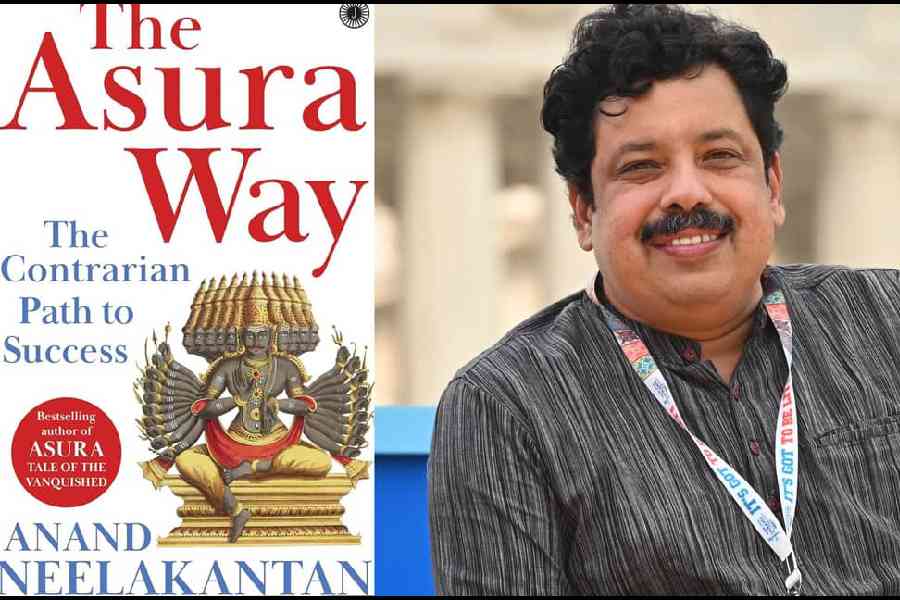Anand Neelakantan had multiple sessions this year at Tata Steel Kolkata Literary Meet in association with Victoria Memorial Hall and in partnership with The Telegraph. While in ‘The Greatest Malayalam Stories Ever Told’ he talked about the pool of writers and their work down south that has inspired him, in ‘Is Ganesha Married?’ he underscored the plurality of voices that exists and that differs in different parts of India and the world in context to the Puranas. Known to have written the Bahubali series which was later adapted on screen that became a blockbuster, Anand also took the opportunity to launch his book The Asura Way, in the presence of a receptive audience and urged them to be like Asuras. A tete-a-tete with the bestselling author with over 15 books to his credit.
Your closing words at the end of the session while launching your latest book, “This will teach you how to be Asura and successful in life” certainly raised eyebrows apart from soft chuckles from the audience. Asura in North India and even in Bengal is considered to be an antagonist and no one would want to be an Asura. What made you put Asura in a positive light?
Asuras are not negative in Hindu Puranas. They are the step-brothers of Devas. Asuras represent those who thrive in chaos. They are materialistic in nature. Hence, I am putting the record straight here. In this chaotic age of Kaliyug, the usual advice about being contented with what you have, considering anger as something to be avoided, treating envy as something evil, or looking at passion as something to be feared — all these will lead to failure in life. To survive and thrive today, one should be able to handle chaos like Asuras. This is a materialistic world. The Asura way is the rational way of life for today.
Also, success is everyone’s goal, what mantra of success can be drawn from Asura?
The Asura Way is about acknowledging the fact that anger, fear, envy, discontentment, passion, greed, etc, are natural emotions. We are wired for all these by nature. Asura way is about channelising such natural forces for success rather than fighting a losing game against them.
You have written about Asura in your earlier books as well, like in Asura The Tale of the Vanquished. How is The Asura Way different from the earlier books, and what new stories does it bring to the readers?
My earlier works were fiction. The Asura Way is the essence and theme of those works. This is a guide for succeeding in Kaliyug, the present dark times. I am taking examples from Indian epics, Puranas and history to show that the only way that has always succeeded is the Asura way. Even when Devas or Gods win, they use the Asura way to win over Asuras. Kurukshetra war is an example. Every Kaurava warrior was killed using the Asura way.
The book is about Kaliyug. Is Asura different in this yug than other yugs?
This yug is different than any other yug. These are the dark times as per the Puranas. This is the time when Asuras win more often. So why not be one? The Asura Way is the manual for Kaliyug. I suggest the Anand way or the path of bliss through the Asura way in the conclusion of my arguments in The Asura Way to lead a successful life in today’s times.
You write for both kids and adults. How different/challenging is the writing process? And which one is more rewarding?
Writing for kids is challenging. As a writer, it is not commercially rewarding, but it gives many other rewards that are priceless. Any awards or monetary compensation can’t replace the love of my young readers.
A lot of authors are writing about mythology now and it’s a growing genre but there’s variation in the tales of North and South. Is there a way to blur that difference?
The greatness of Indian Puranas is their diversity. Every version is different. And there lies its beauty. There is no need to blur the difference, but rather, we should celebrate it.
Your stories have been adapted on the screen and you write scripts as well. Which one do you enjoy more?
I love telling stories. The format is just incidental. I argue from every side. Some of my hit screenplays follow the devotional path. I have written Siya Ke Ram, Sankatmochan Mahabali Hanuman, etc, for TV, while I have written from the antagonist’s side in my novels like Asura, Ajaya and Vanara. Thinking and arguing from all sides is what I enjoy most. Our Puranas are rich and deep, and I am still trying to understand them more deeply. The traditional Indian method of learning anything is to think from every side and analyse them. All my works are my attempts to learn. I am still seeking my path.
Any new project that we can hope to see on the screen next?
I am already writing the screenplay of Srimad Ramayan that is being telecast on Sony TV. I am also developing a business thriller for Rohan Sippy. I have finished the screenplay for a two-part film based on Karna for Rakyesh Om Prakash Mehra.
Will there be more books on Bahubali?
Bahubali was a commissioned work for SS Rajamouli, who had asked me to develop a prequel for Bahubali and expand the story world. I have finished the three books in that series. I would love to do a sequel to the film, and I hope SS Rajamouli would call me again to do the same. It is a fascinating story and deserves many more books and films in that universe.
What are you working on next?
I am working on my magnum opus on Devi. I am also writing a thriller.
